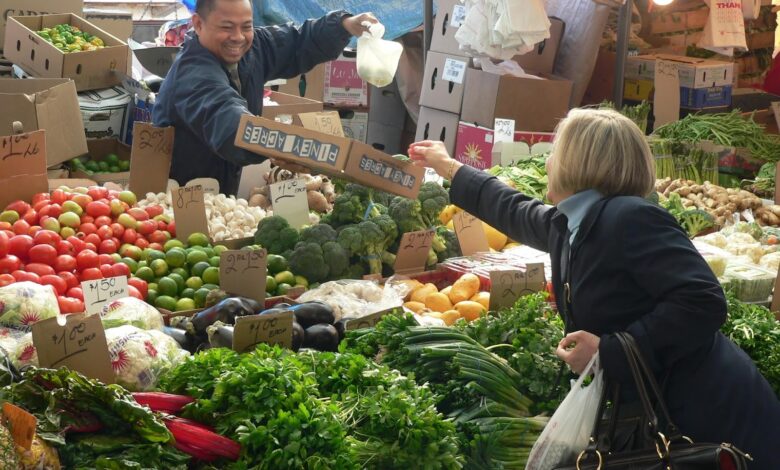
Bostonians’ involvement in local agriculture encompasses a variety of initiatives aimed at integrating farming and food production into the urban environment. Bostonians are showing strong support for local agriculture through various initiatives and activities. Boston hosts numerous farmers’ markets where locals can purchase fresh, seasonal produce directly from farmers. These markets not only support local farmers but also foster a sense of community.
Sarah Johnson, a regular shopper at the Copley Square Farmers Market said she loves coming to the farmers’ market on Saturdays. It’s not just about buying fresh vegetables; it’s about knowing where her food comes from and supporting local farmers who put their heart into what they grow. Farmers’ markets in Boston play a crucial role in connecting residents with fresh, locally-grown produce and other food products. They support local farmers and artisans while promoting sustainable food practices.
Some notable farmers’ markets in and around Boston are Copley Square Farmers Market, Boston Public Market and Dorchester Winter Farmers Market. One of Boston’s most established markets, Copley Square offers a wide range of fresh produce, meats, cheeses, and baked goods. It’s located in a central, easily accessible area, making it a popular destination for both locals and visitors. Although technically an indoor market, the Boston Public Market features local vendors and farmers offering fresh produce, meats, dairy products, and prepared foods.
It operates every day of the week and serves as a hub for local food. Dorchester Winter Farmers Market is a winter market that provides fresh produce and other goods during the colder months. It’s a community-focused market that supports local farmers and vendors. Farmers’ markets provide access to fresh, seasonal fruits and vegetables, often picked just before market days. Purchasing from farmers’ markets supports local agriculture and helps keep money within the community. Many vendors focus on organic and sustainable farming practices, contributing to environmental conservation.
Community Supported Agriculture (CSA) is a model that connects consumers directly with local farmers. This system provides numerous benefits for both parties and fosters a more sustainable food network. Many Bostonians participate in CSA programs, where they buy shares of produce from local farms. This model provides farmers with upfront capital and helps ensure a steady market for their goods.
Consumers, often called members, pay for a share of the farm’s produce at the beginning of the growing season. This upfront payment helps farmers with the initial costs of planting and growing. In return for their investment, members receive regular deliveries or pickups of fresh, seasonal produce throughout the season. This can range from weekly to bi-weekly, depending on the farm. CSA shares can vary in content and size.
Some farms offer traditional vegetable boxes, while others provide options including fruits, dairy products, meats, eggs, or even flowers. CSA members receive high-quality, seasonal produce that is often harvested shortly before delivery, ensuring freshness. By participating, members directly support local farmers, contributing to the local economy and promoting sustainable practices. The upfront payment helps farmers cover the costs of seeds, labor, and other expenses, providing financial stability at the start of the season.
There’s a growing trend of urban farming in Boston. Initiatives such as community gardens and rooftop farms allow residents to grow their own food and support local food systems. This approach offers numerous benefits and plays a key role in enhancing urban sustainability and food security. There are different types of Urban Farming such as community Gardens, rooftop gardens,vertical farming and many others.
In community Gardens spaces are shared where individuals or groups grow vegetables, fruits, and herbs. These gardens are often located on vacant lots or park land. They provide fresh produce, foster community engagement, and offer educational opportunities. Gardens installed on the rooftops of buildings range from small personal gardens to large commercial operations.
It utilizes unused space, reduces urban heat island effect, and can improve building insulation. Vertical Farming involves growing food in stacked layers or vertically inclined surfaces, often in controlled environments like warehouses or specialized structures. It maximizes space in urban areas, uses less water, and can be implemented indoors or in greenhouse-like conditions. Urban farming increases access to fresh, locally grown produce, which can help reduce food deserts and dependency on long supply chains.
It reduces the carbon footprint associated with transporting food, improves urban air quality, and helps manage stormwater through green spaces. Many restaurants in Boston source ingredients from local farms. This not only helps the local economy but also reduces the carbon footprint associated with transporting food. Local restaurants in Boston often emphasize sourcing ingredients from nearby farms and producers, contributing to a more sustainable and vibrant food community.
Many Boston restaurants design their menus around seasonal, locally-sourced ingredients. This ensures that dishes are fresh and support local farmers. Restaurants often establish direct relationships with local farms, receiving regular deliveries of produce, meats, and dairy. These partnerships help ensure a steady supply of high-quality ingredients.
Local organizations and schools often run programs to educate the public about sustainable agriculture and the benefits of supporting local farms. Educational programs focused on local agriculture, urban farming, and sustainable food practices are crucial for fostering community engagement, promoting sustainability, and empowering individuals with knowledge about their food sources. In Boston, various organizations and institutions offer such programs.
For example, the Urban Farming Institute of Boston provides education and training for urban farmers. They offer workshops, resources, and support for individuals and communities interested in urban agriculture. Boston University’s Urban Agriculture Program includes educational initiatives and research focused on urban agriculture. The university’s rooftop farm serves as a learning lab for students and the community.
The Boston Food Forest Coalition works to create and maintain community food forests and edible landscapes throughout Boston. Programs such as educational workshops on permaculture, edible landscaping, and community gardening. There are advocacy groups and local government initiatives aimed at supporting sustainable farming practices and improving access to local produce. Tom Harris, a local food advocate said that advocating for local agriculture means working on policies that support small farmers and sustainable practices.
It’s a collaborative effort that brings together community members, policymakers, and farmers. Boston hosts events like the Boston Local Food Festival, which celebrates local food and agriculture, drawing attention to the importance of supporting local farmers and producers. These efforts collectively contribute to a more sustainable and resilient local food system in Boston.



